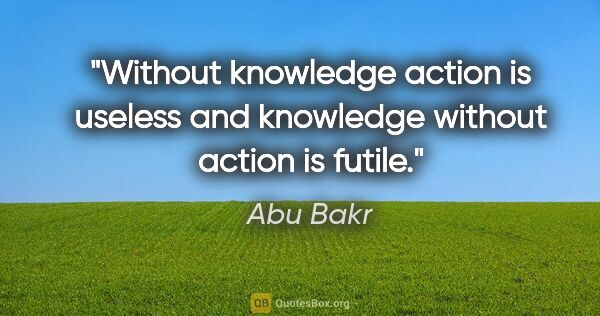Knowledge And Action Quotes
The endless cycle of idea and action,
Endless invention, endless experiment,
Brings knowledge of motion, but not of stillness;
Knowledge of speech, but not of silence;
Knowledge of words, and ignorance of the Word.
All our knowledge brings us nearer to our ignorance,
All our ignorance brings us nearer to death,
But nearness to death no nearer to God.
Where is the Life we have lost in living?
Where is the wisdom we have lost in knowledge?
Where is the knowledge we have lost in information?
The...
T. S. Eliot
Learn to distinguish the difference between errors of knowledge and breaches of morality. An error of knowledge is not a moral flaw, provided you are willing to correct it; only a mystic would judge human beings by the standard of an impossible, automatic omniscience. But a breach of morality is the conscious choice of an action you know to be evil, or a willful evasion of knowledge, a suspension of sight and of thought. That which you do not know, is not a moral charge against you; but that...
Ayn Rand
What I really lack is to be clear in my mind what I am to do, not what I am to know, except in so far as a certain knowledge must precede every action. The thing is to understand myself, to see what God really wishes me to do: the thing is to find a truth which is true for me, to find the idea for which I can live and die. ... I certainly do not deny that I still recognize an imperative of knowledge and that through it one can work upon men, but it must be taken up into my life, and that is...
Soren Kierkegaard
Under these conditions it is no wonder, that the movement of atheists, which declares religion to be just a deliberate illusion, invented by power-seeking priests, and which has for the pious belief in a higher Power nothing but words of mockery, eagerly makes use of progressive scientific knowledge and in a presumed unity with it, expands in an ever faster pace its disintegrating action on all nations of the earth and on all social levels. I do not need to explain in any more detail that...
Max Planck
Since love of God is the highest felicity and happiness of man, his final end and the aim of all his actions, it follows that he alone observes the divine law who is concerned to love God not from fear of punishment nor love of something else, such as pleasure, fame, ect., but from the single fact that he knows God, or that he knows that the knowledge and love of God is the highest good
Baruch Spinoza
Man's mind is his basic tool of survival. Life is given to him, survival is not. His body is given to him, its sustenance is not. His mind is given to him, its content is not. To remain alive, he must act, and before he can act he must know the nature and purpose of his action. He cannot obtain his food without a knowledge of food and of the way to obtain it. He cannot dig a ditch-or build a cyclotron-without a knowledge of his aim and of the means to achieve it. To remain alive, he must think
Ayn Rand
Guilt is not a response to anger; it is a response to one's own actions or lack of action. If it leads to change then it can be useful, since it is then no longer guilt but the beginning of knowledge. Yet all too often, guilt is just another name for impotence, for defensiveness destructive of communication; it becomes a device to protect ignorance and the continuation of things the way they are, the ultimate protection for changelessness.
Audre Lorde
Calvin: The more you know, the harder it is to take decisive action. Once you are informed, you start seeing complexities and shades of gray. You realize nothing is as clear as it first appears. Ultimately, knowledge is paralyzing. Being a man of action, I cannot afford to take that risk. Hobbes: You're ignorant, but at least you act on it.
Bill Watterson
A purely mental life may be destructive if it leads us to substitute thought for life and ideas for actions. The activity proper to man is purely mental because man is not just a disembodied mind. Our destiny is to live out what we think, because unless we live what we know, we do not even know it. It is only by making our knowledge part of ourselves, through action, that we enter into the reality that is signified by our concepts.
Thomas Merton
- 1
- 2
